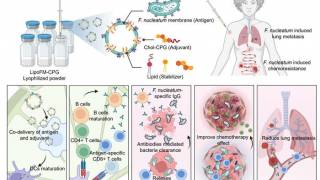Universal Cancer Vaccine Launches Phase 2 Clinical Trial

A Phase II randomized clinical trial will evaluate a proprietary universal cancer vaccine, UV1, in patients with recurrent or metastatic head and neck cancer who will be treated with standard of care therapy pembrolizumab.
UV1 is a peptide-based vaccine inducing a specific T cell response against the universal cancer antigen telomerase.
The trial will be conducted at ten sites across Germany and led by principal investigator Prof. Mascha Binder, M.D., Medical Director, and Head of the Immunological Tumor Group at University Medicine Halle, Germany.
To date, UV1 has been tested in four phase I clinical trials in a total of 82 patients and maintained a favorable safety and tolerability profile as well as encouraging signals of efficacy.
“We continue to strategically expand our clinical development program for our proprietary cancer vaccine, not only by testing UV1 in additional cancer indications with critical need, such as head and neck cancer,” stated Jens Bjørheim, Chief Medical Officer at Ultimovacs ASA, in a press statement issued on December 22, 2020.
The FOCUS (First-line metastatic Or recurrent HNSCC/Checkpoint inhibitor UV1 Study) Phase II trial is an investigator-sponsored, randomized Phase II clinical trial that will recruit patients with recurrent or metastatic PD-L1 positive head and neck squamous cell carcinoma. The study will evaluate the addition of UV1 to a standard of care treatment with PD-1 checkpoint inhibitor pembrolizumab compared to pembrolizumab monotherapy.
A total of 75 patients indicated for treatment with pembrolizumab will be enrolled in the FOCUS study, randomized 2-to-1 so that 50 patients will receive UV1 and pembrolizumab, and 25 patients will receive pembrolizumab alone. The study’s primary endpoint is the progression-free survival rate at six months, and a planned readout of topline results is expected in 2023.
“This clinical trial is the extension of an earlier collaboration with Ultimovacs that introduced me to the therapeutic potential of the UV1 approach,” commented Professor Mascha Binder, M.D., Medical Director and Head of the Immunological Tumor Group at University Medicine Halle.
“I am excited to apply my insights as well as my team’s expertise to this trial to potentially provide head and neck cancer patients with better treatment options.”
UV1 is being developed as a therapeutic cancer vaccine, which may serve as a platform for use combined with other immunotherapy that requires an ongoing T cell response for their mode of action.
As a universal cancer vaccine, UV1’s unique mechanism of action can be applicable across most cancer types.
The clinical development of the UV1 vaccine includes four randomized, multinational, Phase II combination trials recruiting more than 450 patients in total.
The INITIUM trial is an Ultimovacs-sponsored clinical trial recruiting 154 patients with metastatic malignant melanoma to evaluate UV1 combined with ipilimumab and nivolumab as first-line treatment.
The NIPU study is testing UV1 combined with checkpoint inhibitors ipilimumab and nivolumab as second-line treatment in 118 patients with advanced malignant pleural mesothelioma, a rare lung cancer. Oslo University Hospital sponsors the study, and Bristol-Myers Squibb is providing the checkpoint inhibitors for this study. Ultimovacs anticipates announcing data on the primary endpoints for the NIPU and INITIUM studies in 2022.
A third Phase II clinical trial will evaluate UV1 in a new cancer indication combined with indication-specific standard of care cancer therapies different from those to be tested in INITIUM and NIPU.
In this new collaboration, Ultimovacs will supply UV1, and a big pharma company will deliver its proprietary cancer treatment to the clinical trial group, which will sponsor the trial.
The fourth trial, FOCUS, is an investigator-sponsored, randomized clinical trial, enrolling 75 patients with metastatic head and neck cancer receiving pembrolizumab as the standard of care to evaluate its impact, adding UV1 to this regimen.
Ultimovacs’ UV1 universal cancer vaccine candidate leverages the high prevalence of the human telomerase to be effective across the dynamic stages of the tumor’s growth and its microenvironment.
PrecisionVaccinations publishes research-based news.
Our Trust Standards: Medical Advisory Committee

























